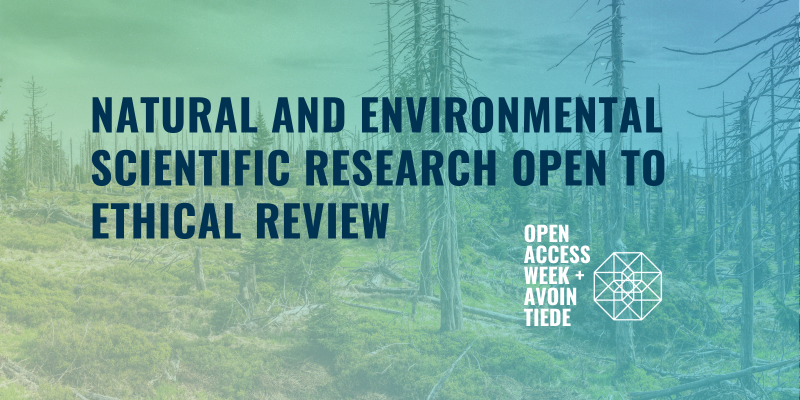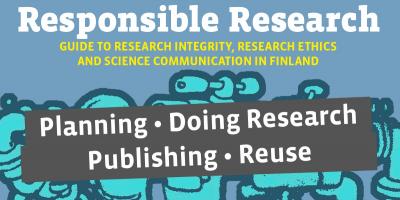Ethical review means scrutiny and evaluation of a research plan in advance in the light of the ethical practices.
What ethical review means is advance scrutiny and evaluation of a research plan in the light of the ethical practices generally followed in that particular discipline of science, with special emphasis on preventing any harm that the research or its results might cause to the research subject.
Medical research
The Medical Research Act and Decree (488/1999) regulates medical research involving human beings.
According to the Act, medical research means research involving intervention in the integrity of a person, human embryo or human foetus for the purpose of increasing knowledge of health, the causes, symptoms, diagnosis, treatment and prevention of diseases or the nature of diseases in general.
The ethics committees of hospital districts are responsible for ethical pre-evaluation of medical research. The National Committee on Medical Research Ethics evaluates the ethical aspects of international multi-centre medicinal trials in cooperation with research ethics committees.
For more information on ethical review in medical research, see the National Committee on Medical Research Ethics.
Human sciences
For research in the humanities and social and behavioural sciences, the Finnish National Board on Research Integrity TENK has issued a set of recommendations on the ethical principles to be followed as well as a proposal for arranging ethical review in these sectors. Recommendations were updated in 2019.
The request for ethical review in human sciences is made to the ethical committee of the research organisation in question (NB: not to TENK).
Ethical questions associated with research in the humanities and social and behavioural sciences relate mainly to the interaction between researcher and research subject, which may involve unpredictable factors. It is always the researcher who bears responsibility for the ethical and moral decisions involved in the research.
Ethical review applies only to precisely defined research configurations. The researcher must request an ethical review statement from a human sciences ethics committee, if their research contains any of the following:
- 1) Participation in the research deviates from the principle of informed consent,
- 2) the research involves intervening in the physical integrity of research participants,
- 3) the focus of the research is on minors under the age of 15, without separate consent from a parent or carer or without informing a parent or carer in a way that would enable them to prevent the child’s participation in the research,
- 4) research that exposes participants to exceptionally strong stimuli,
- 5) research that involves a risk of causing mental harm that exceeds the limits of normal daily life to the research participants or their family members or others closest to them or
- 6) conducting the research could involve a threat to the safety of participants or researchers or their family members or others closest to them.
If the research contains any of the factors above and the research has not undergone ethical review, this may constitute a violation of responsible conduct of research (RCR) and, where necessary, it may be resolved through the process of handling allegations of research misconduct.
An ethical review statement may also be requested when a funding body, collaborative partner, research object or publisher so requests. However, it must be noted that a statement cannot be requested once the research has commenced. Where research is carried out or data is gathered outside Finland, the researcher must familiarise themselves with the ethical review practices in the target country.
Commitment to ethical guidelines
Commitment to the ethical guidelines for research in the humanities and social and behavioural sciences is voluntary and includes an obligation to arrange an ethical review in accordance with the principles set forth by TENK. Nearly all of the third-level institutions and research establishments working in this area in Finland have already committed themselves to complying with the guidelines. New guidelines were published on 19 September 2019 and they are in force from 1 October 2019.
Updated 16.9.2019
Further information:
Ethical review in Finland: http://www.tenk.fi/en/ethical-review-in-finland
The Medical Research Act and Decree: https://www.finlex.fi/fi/laki/ajantasa/1999/19990488
New guidelines: The ethical principles of research with human participants and ethical review in the human sciences in Finland (2019): https://www.tenk.fi/sites/tenk.fi/files/Ihmistieteiden_eettisen_ennakkoarvioinnin_ohje_2019.pdf
Previous guidelines: Ethical principles of research in the humanities and social and behavioural sciences and proposals for ethical review (2009): www.tenk.fi/sites/tenk.fi/files/ethicalprinciples.pdf
You might also be interested in
Tämä teos on lisensoitu Creative Commons Nimeä 4.0 Kansainvälinen -lisenssillä. Detta verk är licensierat under en Creative Commons Erkännande 4.0 Licens. This work is licensed under a Creative Commons Attribution 4.0 International license.

